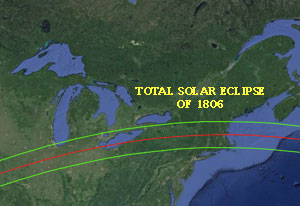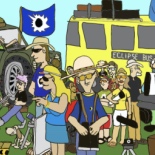 |
www.eclipse-chasers.com Tecumseh and the Eclipse of 1806 Author: Aymen Ibrahem Last update: Saturday, 18-Apr-2015 11:56:55 EDT |
Eclipse Chaser
(noun) - Anyone that wants to see a total solar eclipse.  Search Eclipse Chasers Site
Search Eclipse Chasers Site |
Tecumseh and the Eclipse of 1806
-Bill Kramer
Background information
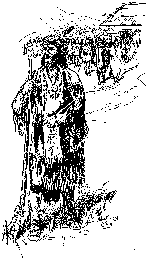 On the 16th of June 1806 the frontier of the United States of America was at the edge of what is now Ohio and Indiana. This land was occupied by the Shawnee Indians and was not being given to the expanding USA with ease. Ohio had just become a state and it was obvious that the spread would continue to the west. President Jefferson had appointed William Henry Harrison as governor of the Indiana territory and the basic greed of rapid growth had taken hold of everyone. William Harrison would be the ninth president of the USA and was building his reputation as someone who gets the job done. In this case his job was the expansion of the western frontiers of the USA.
On the 16th of June 1806 the frontier of the United States of America was at the edge of what is now Ohio and Indiana. This land was occupied by the Shawnee Indians and was not being given to the expanding USA with ease. Ohio had just become a state and it was obvious that the spread would continue to the west. President Jefferson had appointed William Henry Harrison as governor of the Indiana territory and the basic greed of rapid growth had taken hold of everyone. William Harrison would be the ninth president of the USA and was building his reputation as someone who gets the job done. In this case his job was the expansion of the western frontiers of the USA.
Various campaigns were waged during the summers as thousands of recruits and full time soldiers would march into the Indian lands and ravage crops and towns. And in retribution the Indians harassed many towns and settlers. At first the Indians were a loosely formed federation of tribes who supplied warriors for specific campaigns. A prolonged war or a war of attrition was unfamiliar to them and as a result the settlers were gaining ground quickly. Ohio had just applied for and been granted statehood in 1803 and Indiana was next. Settlements were following the course of the Ohio River.
At that time a leadership stepped forward from the Shawnee people in the form of two brothers. One was a war chief and greatly admired by all that knew him. His name was Tecumseh and he was said to be a brilliant student fluent in multiple languages as well as a gifted warrior and hunter. Tecumseh's biographical information is full of fantastic legends. His exploits as a cunning war leader are well known since his campaigns inflicted great damage in some areas. Tecumseh's younger brother, Tenskwatawa (Open Door), more commonly known as "The Prophet", was said to be slightly deformed and one of a rare set of triplets. As a result he never reached the hunting and warrior status of his brothers. The stories say that he developed other interests, namely he was known as a drunk, or so the story goes.
According to one account, Tenskwatawa awoke from his drunken stupor and decided that this was wrong and began to preach a way of abstinence to the others in his tribe. He claimed to have been visited by the Great Spirit and taught a better way. His conviction was strong and along with his brother they formed a large confederation of tribes with a principle town at Tippecanoe.
This collection of Indians with a common bond bothered the expanding white settlers. The country was growing quickly and the Ohio River was an important component of that expansion. Having an "enemy" so close was not a comfortable situation. Although each side talked of peace, each side also made maneuvers to undermine the other, both politically and in minor battles. And that brings us to our story about the eclipse.
The Legend of the Eclipse of 1806
Harrison was looking for a way to discredit the brothers in the eyes of the Indians. The Prophet claimed to have almost divine powers. So Harrison decided to put forth a challenge. Using his Christian upbringing as a base, Harrison wrote an open letter to the Indians gathered at Tippecanoe. He wrote: "If he (the Prophet) is really a prophet, ask him to cause the Sun to stand still or the Moon to alter its course, the rivers to cease to flow or the dead to rise from their graves". In other words, he wanted to see them produce a miracle of biblical proportions. What he did not expect was the reaction of the Indians to this request. For them, this request had different meaning.
This letter was presented to the brothers when they were visiting a friend along the White River. One story has the two of them going inside to meet in private. After an hour had passed, the Prophet requested that all in the village be assembled for him to deliver his response. He said the he had consulted with the Great Spirit and that she was not happy about Harrison's request. Thus the Great Spirit had agreed to give a sign that the Prophet could share with others in advance to demonstrate just how closely related they were. The Prophet spoke in a loud and confident voice saying that: "Fifty days from this day there will be no cloud in the sky. Yet, when the Sun has reached its highest point, at that moment will the Great Spirit take it into her hand and hide it from us. The darkness of night will thereupon cover us and the stars will shine round about us. The birds will roost and the night creatures will awaken and stir."
At around noon on the appointed day, June 16th 1806, a total solar eclipse crossed the region. A long eclipse with a band of totality stretching from near the southern tip of Lake Michigan to just north of Cincinnati it encompassed most of the lands inhabited by Tenskwatawa's followers. In Greenville, where Tenskwatawa and Tecumseh waited for the event, close to a thousand had gathered to see the Prophet's sign. The Prophet waved his arms towards the eclipse at the appropriate time, and the people were truly impressed.
One problem with this story is that Greenville, the supposed site for the gathering to view the total eclipse is OUTSIDE the path of totality. It is close to the edge such that a 99% eclipse would be seen and that is quite something in itself. The thing is, a total eclipse is really impressive while a near total eclipse is just tantalizing.
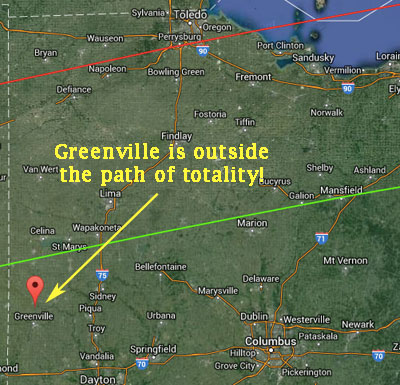
How Did the Prophet Know?
The question of just how Tecumseh and Tenskwatawa came to know about the eclipse is not clear. Tenskwatawa did not travel much and tended to stay near his village and town of Tippecanoe where he governed his followers. Tecumseh, on the other hand, traveled frequently and was known to associate with many people of diverse backgrounds, include a great deal of white settlers. It is possible that he ran across this information at some time in his travels as there were eclipse chasers from the eastern USA in the lake Erie area.
It is also possible that Tecumseh had access to an almanac when he was learning to read English* and simply filed the information away for later retrieval as good students are prone to do. An almanac would have been a useful book for a farmer in the frontier to have handy. He did consider several settlers to be friends and it is also possible that one of them could have told him about the eclipse however no stories have emerged in Ohio history of such an event. If someone had, they would have most likely suffered some retribution from Harrison as he lost a lot of political ground with this blunder - thus it would have been wise to remain reticent.
Did Tecumseh have an almanac himself? Word reached the brothers when they were in the town of Buckangehela's Town and not in Tecumseh's Town of Greenville. And they gave their response shortly afterwards. It is unlikely that any almanacs would have been available giving the details of the eclipse at this village and also unlikely that Tecumseh would have traveled with an instrument of his enemy. It is more likely that Tecumseh remembered that tidbit of information at just the right time. When the challenge arrived he would have marveled at the wonderful opportunity that had been provided.
It is also possible that the information was provided by other sources such as another Indian who had been studying an almanac or was a student of astronomy. Based on direct evidence from eyewitness accounts, the Shawnee people did not track the movements of the Sun and Moon with great precision. As a result it is unlikely that they had determined this information on their own in the time indicated by this story (less than an hour). In addition, the impact of this event and the subsequent lifting of the Prophet's status in the eyes of the many Indian tribes who had heard of the prophesy indicates that it was not anticipated by any others. Thus it is unlikely that any other tribal shaman or wise man knew of this event about to occur. Of if they did, they wisely remained quiet for political reasons.
Although eclipse chasing into the wild frontier may have brought Tecumseh into contact with astronomers arriving well in advance to establish a base camp I could not find any references to expeditions into the part of the country he roamed. The best opportunity would have been a chance encounter near Michigan where there were numerous active trade routes. If anyone knows of any expeditions please let the author know! As an experienced eclipse chaser I would have selected a location along the Great Lakes nearer to settlements, forts, and available transportation (traders).
Either the brothers learned of the eclipse in advance through an almanac, from someone who knew of the upcoming eclipse, or the Great Spirit revealed it to them: the choice is open to debate as no substantial records exist. Just legends and stories.
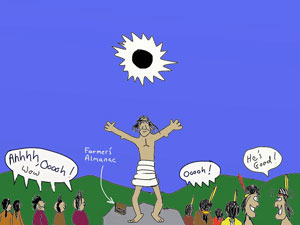
* Tecumseh learned to read English from Rebecca Galloway, the daughter of a settler in western Ohio that he befriended. I contacted the Galloway House Museum via email and asked if they had knowledge of the books that may have been available to Tecumseh for reading. I was informed that the Galloways were avid readers and kept many books. I further asked if an almanac would possibly have been part of the collection and was told that many farmers did have a copy of this particularly useful book hence it is very likely that the Galloway's had a copy. However, one is not included in the few books that did survive from that time.
This article was inspired from stories in: "A Sorrow in our Heart: The Life of Tecumseh" and "The Frontiersmen"; both are excellent semi-fictional works by Allan Eckert.
More information:
http://www.ohiohistorycentral.org/w/Tenskwatawa?rec=312
http://www.identityindependence.com/tecumsehbrother.html
http://www.shelbycountyhistory.org/schs/indians/early1800s.htm
